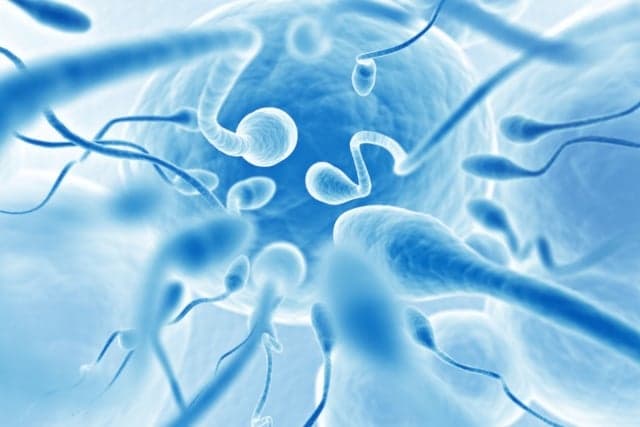Semen quality of young Swiss men 'in critical state'

Nearly two thirds of Swiss men aged 18 to 22 have poor sperm quality according to a new study of potential army recruits.
The study, which was headed up by researchers at the University of Geneva, comes in the context of declining birth rates in the industrialized world over the last half century.
It looked at the sperm quality of 2,523 army recruits conceived and born across Switzerland to assess male reproductive health.
Authors found that only 38 percent of the young men studied had sperm that met World Health Organization reference values for the total number of spermatozoa, their motility (or movement) and morphology.
At the same time, they found that at least one in three of these parameters did not meet WHO reference criteria in 60 percent of men. Five percent of men had a problem with all three parameters.
The median sperm concentration was just 48 million per millilitre. This puts Switzerland at the bottom of the European table alongside countries like Denmark, Norway and Germany.
In a statement, study co-author Alfred Senn warned against reading too much into a single semen analysis, noting that it could not fully predict someone’s fertility.
“But, in overall terms, the results suggest that the sperm quality of young men in Switzerland is in a critical state and that their future fertility will in all likelihood be affected,” he said.
The study – the first nationally representative survey of its kind – found only minor differences between sperm quality in Switzerland’s different geographic regions while there was no difference between urban and rural areas.
Maternal smoking during pregnancy was identified as an associated factor although no causal link was found.
A possible link with testicular cancer
The study also looked at the possible link between testicular cancer and poor sperm health.
The rate of testicular cancer in Switzerland increased from 7.6 cases per 100,000 in 1980 to 10.4 per 100,000 in 2014 – very high by European standards.
Researchers now plan to try and identify the causes of testicular cancer by further assessing the impact of environmental or lifestyle factors.
“We would also like to go back to the 2,523 men who took part in the study in about 10 years so we can follow up their reproductive health and find out whether they have had children or have suffered from testicular cancer, for example,” said study author Rita Rahban, a researcher in the Department of Genetic Medicine and Development at the University of Geneva.
Comments
See Also
The study, which was headed up by researchers at the University of Geneva, comes in the context of declining birth rates in the industrialized world over the last half century.
It looked at the sperm quality of 2,523 army recruits conceived and born across Switzerland to assess male reproductive health.
Authors found that only 38 percent of the young men studied had sperm that met World Health Organization reference values for the total number of spermatozoa, their motility (or movement) and morphology.
At the same time, they found that at least one in three of these parameters did not meet WHO reference criteria in 60 percent of men. Five percent of men had a problem with all three parameters.
The median sperm concentration was just 48 million per millilitre. This puts Switzerland at the bottom of the European table alongside countries like Denmark, Norway and Germany.
In a statement, study co-author Alfred Senn warned against reading too much into a single semen analysis, noting that it could not fully predict someone’s fertility.
“But, in overall terms, the results suggest that the sperm quality of young men in Switzerland is in a critical state and that their future fertility will in all likelihood be affected,” he said.
The study – the first nationally representative survey of its kind – found only minor differences between sperm quality in Switzerland’s different geographic regions while there was no difference between urban and rural areas.
Maternal smoking during pregnancy was identified as an associated factor although no causal link was found.
A possible link with testicular cancer
The study also looked at the possible link between testicular cancer and poor sperm health.
The rate of testicular cancer in Switzerland increased from 7.6 cases per 100,000 in 1980 to 10.4 per 100,000 in 2014 – very high by European standards.
Researchers now plan to try and identify the causes of testicular cancer by further assessing the impact of environmental or lifestyle factors.
“We would also like to go back to the 2,523 men who took part in the study in about 10 years so we can follow up their reproductive health and find out whether they have had children or have suffered from testicular cancer, for example,” said study author Rita Rahban, a researcher in the Department of Genetic Medicine and Development at the University of Geneva.
Join the conversation in our comments section below. Share your own views and experience and if you have a question or suggestion for our journalists then email us at [email protected].
Please keep comments civil, constructive and on topic – and make sure to read our terms of use before getting involved.
Please log in here to leave a comment.